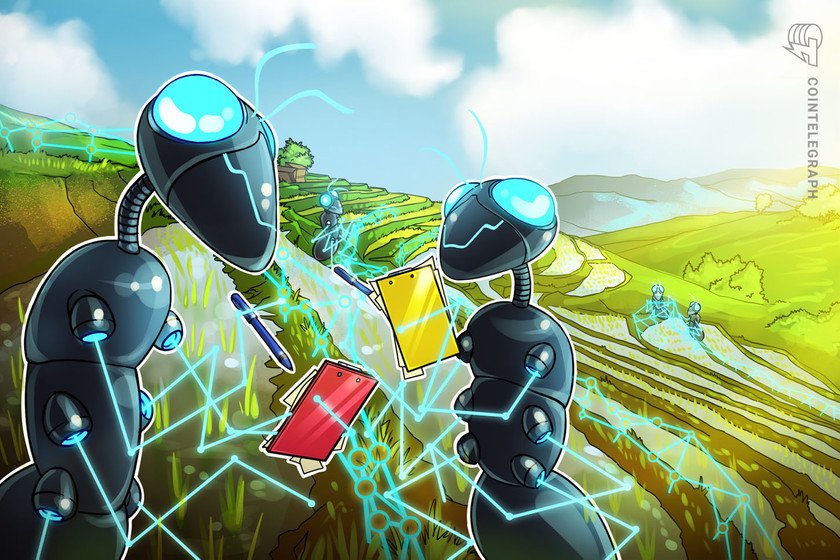The area meals and agriculture enterprise is a thousand billion-buck sector that is increasing exponentially. Based fully totally on findings from the World Financial institution, agriculture by myself accounted for 4% of world domestic product, or GDP, of the US in 2018. The document additional renowned that agriculture may perchance presumably per chance per chance yarn for more than 25% of GDP in organising worldwide locations.
Meanwhile, it’s important to show that orderly corporate farms play a dominant goal within the agriculture enterprise. As an illustration, study from the US Division of Agriculture (USDA) shows that predominant farms accounted for 89% of meals production within the U.S. in 2015.
This looks to unruffled be the case, as key agricultural markets live dominated by very few companies. This has change into great more apparent, because the USDA honest nowadays announced plans to invest $500 million to serve make certain that U.S. agricultural markets are more dazzling and accessible to runt farmers and ranchers.
Even supposing authorities funding may perchance presumably per chance per chance serve vastly, farmers within the future of the globe are additionally starting up to adopt smarter agriculture technologies — such as blockchain and data analytics — to make certain that the increasing agricultural calls for are met. On the identical time, these technologies are permitting runt-scale farmers to procure a necessity of advantages that were no longer previously doable.
Farmers wreck into world markets
Max Makuvise, president and co-founder of E-Farm animals Global — a social endeavor that has developed a blockchain-based cattle tracing app for farmers in Zimbabwe — instructed Cointelegraph that Africa accounts for 20% of the area cattle inhabitants, but the negate only contributes 3% of the sphere’s beef consumption.
Based fully totally on Makuvise, farmers in worldwide locations relish Zimbabwe contain a advanced time breaking into world cost chains because of the challenges inviting visibility, ownership and have confidence. These factors worsened after the outbreak of a tick-borne illness in 2018 that introduced about the dying of 50,000 cattle in Africa.
The lack of a legit traceability machine has resulted in Zimbabwe being unable to export beef to profitable markets in fresh years. In remark to resolve this, Makuvise hopes that a blockchain-based solution designed to convey visibility and proof-of-ownership to Africa’s cattle market may perchance presumably per chance per chance in all likelihood be the answer: “Blockchain affords have confidence and verification that can serve convey farmers to world markets.”
Powered by Mastercard’s blockchain-based provenance solution, the E-Farm animals Global app works by offering cease-to-cease visibility to the cattle provide chain. To place this into standpoint, Makuvise explained that hundreds of cattle in Zimbabwe are on a regular foundation “dipped” to cease ticks and parasites. But, it is miles within the future of this project when cattle ownership becomes engaging. “About 2,000 cattle will fight by this dip tank, all of which is able to be owned by 500 or more cattlemen,” acknowledged Makuvise.
Kamran Shahin, vice president of blockchain product trend and innovation at Mastercard MEA, instructed Cointelegraph that the E-Farm animals Global solution solves this self-discipline by permitting industrial farmers and dipping officers to model every of the cow’s head with an extremely-high radio-frequency identification (RFID) model, as mandated by the Ministry of Agriculture of Zimbabwe, to register the cow and its owner. Shahin added:
“At any time when the animal will get dipped, vaccinated, or receives medical treatment, the model data the match onto the traceability machine. Leveraging Mastercard’s Provenance solution, E-Farm animals Global data these events to maintain a stable and tamper-proof poke of each animal’s history.”
Based fully totally on Shahin, this total project captures precious data for both the farmer and the meat consumers. “For farmers, it affords an irrefutable file that proves ownership, helps gross sales and exports, as nicely as lets in them to procure a mortgage, the explain of their cattle as collateral.” On the flip side, Shahin explained that this permits consumers to successfully negate up their operations and guarantee product quality to potentialities.
Extra importantly, farmers enrolled in E-Farm animals Global’s machine now perform procure entry to to world markets because of the the accomplished visibility captured and recorded on the blockchain. Makuvise elaborated: “In Africa, we previously didn’t contain any traceability machine, making it most no longer more seemingly to export beef.” He added that which potential that, the “animal can then be slaughtered and exported, and farmers can assemble a top rate tag for his or her beef.”

As nicely as to cattle farmers in Africa, coffee and cocoa farmers in Honduras are leveraging blockchain traceability to perform procure entry to to unique markets. Heifer Global, a world nonprofit that targets to total world starvation and poverty by sustainable farming, is the explain of IBM Meals Trust — a community powered by IBM’s blockchain skills — to procure provide chain visibility for coffee and cocoa farmers in Honduras.
Findings from Heifer Global showcase that runt-scale coffee farmers operate at a imply of between a 46% to a 59% loss, with farmers incomes much less than 1% from the sale of a cup of coffee at a coffee store. Jesús Pizarro, vice president of financial innovation at Heifer Global, instructed Cointelegraph that Heifer is particularly leveraging blockchain to serve watch over the associated payment chain for runt-scale farmers because it solves the topic of traceability:
“Problems of traceability contain always been a self-discipline. We mediate that offering cease-to-cease transparency within the meals provide chain can resolve many social considerations, starting up with offering visibility to runt-scale farmers.”
As such, IBM’s Meals Trust platform traces coffee beans from runt farms the total blueprint to coffee retail outlets. IBM Blockchain executive Kurt Wedgwood instructed Cointelegraph that this particular project begins with Heifer uploading data in regards to the nurse vegetation shipped to farmers onto the IBM blockchain community. After harvest, Wedgwood renowned that farmers model and ship their beans to Copranil processors, a coffee cooperative in Honduras.
Extra data in regards to the beans is then recorded onto the blockchain, including how the beans were cleaned, dried and roasted, and if they met the requirements for dazzling swap, organic or other specifications. Ultimately, this data is shared with corporate consumers who can additionally procure entry to the information in regards to the beans to clutch the prices.
While this project sounds stunning easy, a truly valuable ingredient to clutch is how this opens procure entry to to world markets for runt-scale farmers. Wedgwood acknowledged:
“By leveraging blockchain, we set a connection between the farmer, producer and particular person while enabling the farmer to belong to a larger market. Ultimately, this exposes consumers to more range and the next skills of their coffee need. Now we contain the power to join all these folks at scale, which would perchance presumably per chance per chance enable producers to cost more which potential that, and ought to lead to elevated earnings for runt-scale farmers.”
It all boils down to visibility
Total, farmers that are leveraging blockchain are ready to procure one predominant income that has been an ongoing self-discipline within the future of the meals enterprise — provide chain visibility. Once visibility has been established, farmers can wreck into world markets, generate larger earnings and may perchance presumably per chance procure advantages relish financial inclusivity.
As an illustration, Makuvise identified that financial inclusivity for farmers in many African worldwide locations has been engaging, since these folks are unable to borrow money without proof of collateral. E-Farm animals Global’s solution makes an strive to resolve this by offering proof-of-ownership for the cows, permitting farmers to procure a mortgage by the explain of their cattle as collateral.
 Cattleman scanning cows with RFID tags on ears; Image offer: E-Farm animals Global
Cattleman scanning cows with RFID tags on ears; Image offer: E-Farm animals GlobalMoreover, consumers and consumers additionally procure pleasure from meals visibility because it generates have confidence. Keith Agoada, co-founder and CEO of Producers Market — a digital platform dedicated to the industrial and social nicely-being of farmers — instructed Cointelegraph that folks desire to know the put their merchandise are coming from and the draw in which it has impacted the atmosphere and communities within the future of its production:
“For those farmers and producers who are managing their operations within the ‘upright blueprint,’ blockchain may perchance presumably per chance additionally honest additionally be part of the have confidence-constructing project to face out within the market by connecting with brands and consumers who fragment these values.”
A document from The Blockchain Analysis Institute entitled “Agriculture on the Blockchain” additional explains that “Traceability for meals security is up to now doubtlessly the most adopted utility of blockchain for agriculture.” Even supposing this may perchance be, challenges hampering boost and adoption of these choices live.
As an illustration, Pizarro talked about that authorities enhance in regions relish Honduras is wished in remark for companies to clutch how severe meals provide chain visibility is for consumers: “The skills is readily within the market, nonetheless I don’t mediate the position quo will swap without governments pushing for this swap.”
While this may perchance be the case in Central The United States, Makuvise shared that the governments in regions of Africa are pondering blockchain choices because of the the information being generated. Based fully totally on Makuvise, the governments that E-Farm animals Global has spoken with are pondering having procure entry to to data that shows what number of cattle are in every provenance, which is able to serve enhance planning efforts that are usually done by guessing estimates. Makuvise additional identified that sensitive data may perchance presumably per chance additionally no longer ever be shared in this instance, nonetheless linked data that would serve with city planning would be supplied.
On the flip side, Makuvise explained that the particular self-discipline for the adoption of blockchain choices for provide chain visibility in Africa is overall acceptance: “Blockchain-based choices may perchance presumably per chance per chance preserve longer to be adopted in Africa because folks are visible and desire to peep the advantages of the skills first. Once the advantages change into apparent, more folks will procure on board.”


